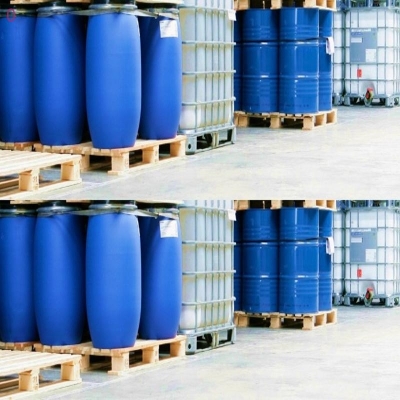-
Categories
-
Pharmaceutical Intermediates
-
Active Pharmaceutical Ingredients
-
Food Additives
- Industrial Coatings
- Agrochemicals
- Dyes and Pigments
- Surfactant
- Flavors and Fragrances
- Chemical Reagents
- Catalyst and Auxiliary
- Natural Products
- Inorganic Chemistry
-
Organic Chemistry
-
Biochemical Engineering
- Analytical Chemistry
- Cosmetic Ingredient
-
Pharmaceutical Intermediates
Promotion
ECHEMI Mall
Wholesale
Weekly Price
Exhibition
News
-
Trade Service
[ Focus on Chemical Machinery and Equipment Network ] At the beginning of 2020, the sudden epidemic has caused many factories to face the situation of "no one available", and some factories have not been greatly affected due to the massive use of robots.
They resumed work and production early.
The production order is stable.
Chemical machinery and equipment network hotspots pay attention to chemical machinery and equipmentThey resumed work and production early.
The production order is stable.
Driven by the advancement of artificial intelligence technology, and affected by the decline in demographic dividends and rising labor costs, smart factories and industrial robots are more and more widely used in production, and "machine substitution" has become a transformation and upgrading of the manufacturing industry.
The inevitable trend.
The inevitable trend.
Bill Gates once predicted that robots will repeat the rise of personal computers and become the next technology that will change the world.
In fact, the rapid development of robots in recent years seems to confirm this prediction.
On October 20, the World Economic Forum report showed that by 2025, more than 85 million human jobs will be replaced by machines.
In fact, the rapid development of robots in recent years seems to confirm this prediction.
On October 20, the World Economic Forum report showed that by 2025, more than 85 million human jobs will be replaced by machines.
The survey of the World Economic Forum covered 300 large-scale companies with nearly 8 million employees.
More than 50% of employers surveyed expressed their desire to speed up the automation of some positions in the company.
43% of employers said that they may cut jobs due to technical reasons.
Data-based artificial intelligence technology can help companies replace people's various production activities with various automated devices, thereby improving the overall development efficiency of society.
More than 50% of employers surveyed expressed their desire to speed up the automation of some positions in the company.
43% of employers said that they may cut jobs due to technical reasons.
Data-based artificial intelligence technology can help companies replace people's various production activities with various automated devices, thereby improving the overall development efficiency of society.
In recent years, driven by policies and markets, many domestic companies are actively deploying robots in various production links to achieve rapid replacement of production lines, and the instrumentation manufacturing industry is no exception.
For example, a large number of companies such as Wasion Group, Sichuan Instrument Co.
, Ltd.
, Tiankang Group, and Fujian Hongrun Precision Instruments have achieved reductions in employees and increased efficiency through "machine substitution".
Instrumentation For example, a large number of companies such as Wasion Group, Sichuan Instrument Co.
, Ltd.
, Tiankang Group, and Fujian Hongrun Precision Instruments have achieved reductions in employees and increased efficiency through "machine substitution".
From labor-intensive reincarnation to intelligent manufacturing, "machine substitution" in the manufacturing industry has become an irreversible trend.
This transformation, on the one hand, is to hedge against the impact of the loss of workers and "difficulties in recruiting"; on the other hand, it is hoped to improve production efficiency and quality to save costs.
This transformation, on the one hand, is to hedge against the impact of the loss of workers and "difficulties in recruiting"; on the other hand, it is hoped to improve production efficiency and quality to save costs.
With the development of intelligent manufacturing technology and the acceleration of "machine substitution", many front-line workers are beginning to worry that "machine substitution" will affect their "rice bowls.
" In fact, behind the "machine substitution", the importance of talents will become more prominent.
In the future, simple jobs with a single skill and a single technology will be "dispelled", but new multi-skilled, multi-skilled and compound jobs are rapidly emerging.
The production rate of these new professional jobs may even exceed the rate of disappearance of simple traditional jobs.
" In fact, behind the "machine substitution", the importance of talents will become more prominent.
In the future, simple jobs with a single skill and a single technology will be "dispelled", but new multi-skilled, multi-skilled and compound jobs are rapidly emerging.
The production rate of these new professional jobs may even exceed the rate of disappearance of simple traditional jobs.
Therefore, the phenomenon of "decreasing people" and "increasing people" in the process of "machine substitution" will reduce the number of general workers in repeatable types of work, and increase the number of new skilled workers who are suitable for professional use for programming and maintenance of robots.
Maintenance etc.
Nowadays, many manufacturing companies call for a shortage of people.
In fact, they are lacking technical personnel.
Robot technicians, robotics engineers and other skilled workers are even more "difficult to find.
"
Maintenance etc.
Nowadays, many manufacturing companies call for a shortage of people.
In fact, they are lacking technical personnel.
Robot technicians, robotics engineers and other skilled workers are even more "difficult to find.
"
Therefore, in the face of "machine substitution", front-line workers do not need to worry too much, but they need to be properly prepared, especially those who are engaged in repetitive tasks and have a weak educational background, need to raise their risk awareness and take precautions.
Through internal training or professional certification training of training institutions, learn robot operation, robot maintenance, robot programming and other technologies, equip yourself with new skills, and transform from traditional blue-collar workers to “gray-collar” workers who direct robots.
Eliminated.
Through internal training or professional certification training of training institutions, learn robot operation, robot maintenance, robot programming and other technologies, equip yourself with new skills, and transform from traditional blue-collar workers to “gray-collar” workers who direct robots.
Eliminated.
"Machine Substitution" is here, are you ready?
Original title: 85 million jobs will be replaced, how can front-line instrument workers keep their "rice bowls"?







